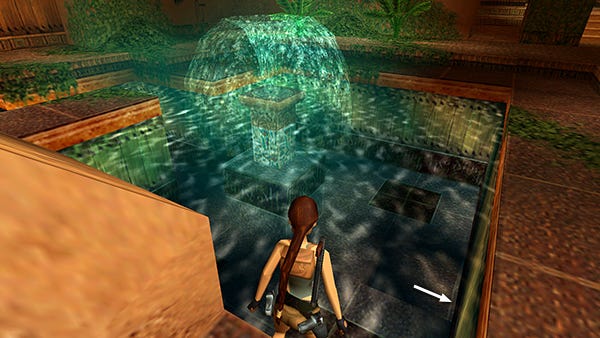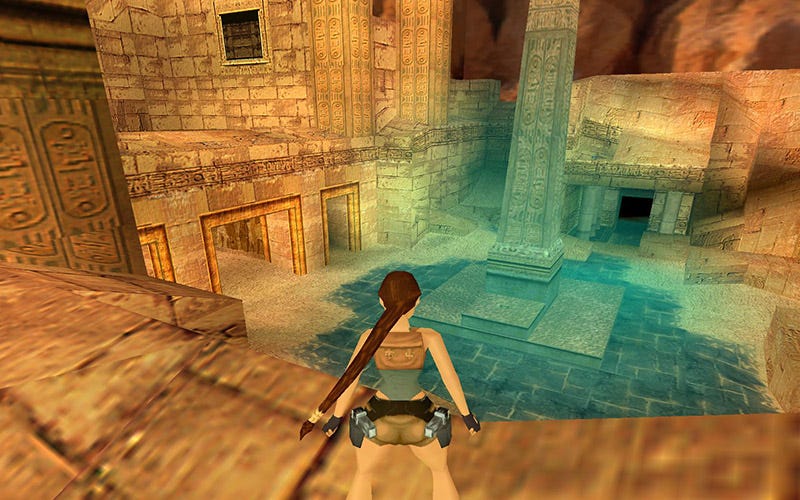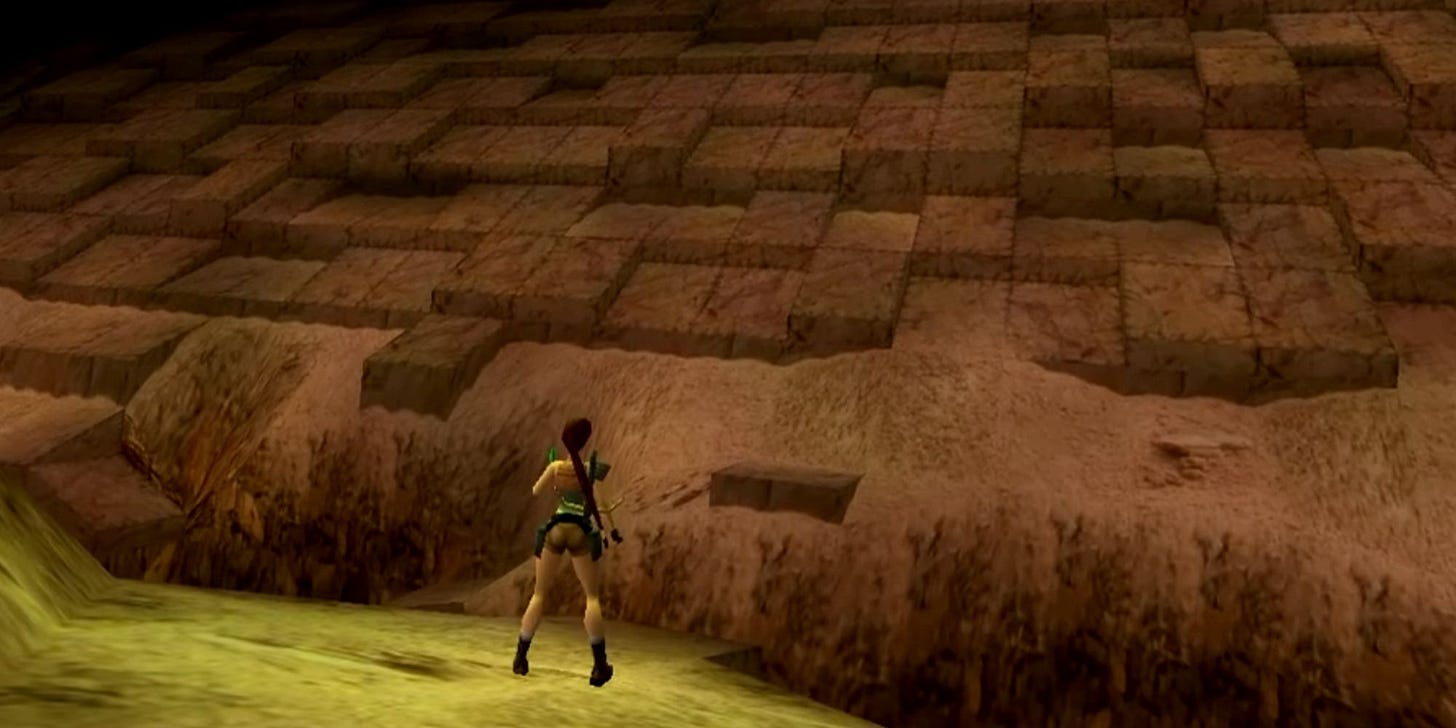Tomb Raider IV Remastered: A Nostalgic Return
When Tomb Raider IV Remastered came out in 2025, I pre-ordered it two weeks in advance (genuinely) so I could connect with a familiarity from the past (which my fiancé got me as a Valentine’s Day present—I know, he’s a keeper!). I thought it would take me back to myself at age 6, sitting on my dad’s left knee, playing the OG version on his PC with a mouse and keyboard, dungarees on and hair in a Pocahontas-themed clip.
I.
Was.
Addicted.
For those that know me, I am a keen gamer. I love it so much, I often daydream about tackling a difficult level or appreciating the works of a finely constructed landscape while walking, working, eating, laughing, running... a home in my head. Games are always within the substrate of my thoughts.
I even mention it in my first book ‘Explaining Humans’ how it helped form a basis for me understanding society when I got into Civilization V before going out into the real world of work. Simulations of programmed societies became the new dinner parties and formed one of the main ways I got to know any context before stepping out into the sun. Context made everything feel better, more fluid, and the wheels of conversation and connection turn smoother. But still, I missed the feeling Tomb Raider gave me—not just an indulgence in nostalgia, but the way its movement was designed to stop and rotate before running.
Addicted.
My Great Revelation: The Power of Tank Controls
No, like a whole-new-lease-of-life-and-went-on-the-school-bus-with-no-tantrums kind of addicted. I liked that it gave me room to respond and move—it was cathartic, like a massage for my brain, or like plunging it boiling hot into a bucket of ice-cold milk. I was meticulous in mastering the perfectly aligned jumps, the rotations before turning, the last-minute escapes from beetles, scorpions, or crocodiles. I’d carefully curate my next steps, standing at the edges of giant pyramids, one wrong move away from falling into the dark trenches of what seemed like a constant, looming darkness of Egyptian nightfall—vast, endless, and waiting, as if the desert itself had swallowed time whole.
But 28 years later, playing this remastered version on PS5, I realized something—I had been playing a specific type of mode called Tank Controls, compared to most games past the Millenium, which are more fluid and modern. At first, I thought it was some über-gamer language that I was now too cool to understand. But after doing some googling, I realized I was a lot closer to knowing what it was than I thought.
I didn’t just know what Tank Controls were—I had been unknowingly embodying them in everything.
Yes, dear reader, I had a revelation while playing Tomb Raider: The Last Revelation.
OK, SO BASICALLY—What Are Tank Controls?
Tank controls are exactly what they sound like—decisions and movements are much like that of a tank: considered, weighty, rigid, and intentionally aligned. Older games couldn’t rely on smooth camera angles to do the work for you. You had to stop, rotate, then move in a new direction—a bit like being in a chess grid. Not to mention my proclivity to collect every. single. object (as you never know you might need it). My inventory is big and my impulses slow. Always readily resourced.
Whereas modern controls are fluid (Something that Joe, my partner, prefers), where movement can be made mid-motion without needing to align first, tank controls require precise positioning before taking action.
It's a control scheme in video games where a player controls movement relative to the position/direction of the character and not the camera angle (like modern controls).
Which in all honesty, is the story of my life. A considered thinker and a fast mover.
Realizing This Was How I Move Through Life
It suddenly became so clear—not only was I a Tank Controls gamer (and had now discovered my long-standing distaste for faster, impulsive gaming styles), but this was how I approach everything in my life.
I consider every decision like a tank—pausing before moving, turning before taking action, and committing fully once I go . I can barely answer a question from another room while putting my socks on because my focus is fully on one task at a time. Every thought, movement, action is 100% intentional.
The rigid, retro, yet deliciously deterministic way of moving characters in the late ’90s has set a precedent for my every method of thought. Perhaps that’s why I stuck with this game for so long—no matter how frantic it was, it was designed to give you room to think and turn, and I absolutely loved that.
All connections and people outside the PC felt fast, fluid, ambiguous, giving me no room to even understand, let alone respond. But this—this tank-controlled ’90s wonder—shared a grid-based system that felt like a home from home. Designed to be configured.
Tank Controls and Autism: A Perfect Parallel
Modern controls prioritize adaptability, rapid reaction, and intuition—things that often come naturally to neurotypicals but can feel overwhelming and imprecise for autistic individuals.
Tank controls, by contrast, offer a sense of stability, structure, and predictability, mirroring the way many autistic people prefer to interact with the world—where every move has logic, order, and clarity. It’s precise nature enables gamer to naviagte precarious ledges and accurate leaps of faith between ledges, hills, rocks and here’s a flex - they are considered one of the hardest control modes in gaming.
WHY?
It's a control scheme in video games where a player controls movement relative to the position/direction of the character and not the camera angle (like modern controls).
Which in all honesty, is the story of my life. A considered thinker and a fast mover. Don’t worry about it, I got you.
Where neurotypicals move through life fluidly, adjusting quickly to shifting social cues, spontaneous changes, and environmental unpredictability, I don’t. For me, life has always felt grid-based—every action carefully thought through, every transition requiring preparation before execution.
It’s not a limitation, it’s just a different operating system.
This realization didn’t just change how I see games—it helped me understand myself.
Final Thoughts
Tomb Raider didn’t just bring me back to my childhood—it highlighted the way I process, decide, and navigate the world. 🌎
While modern games (and modern life) demand quick reactions and adaptability 🎮, Tank Controls provide order, structure, and logic—a way of interacting with the world that feels natural to me.
For those who relate—whether as gamers, autistic individuals, or just deep thinkers—I see you. And if you also pause before moving, rotate before running, and feel most at home in the deliberate precision of the old-school grid, then maybe, like me, you were always meant to play life on Tank Controls. 🕹️
This doesn’t make you old or outdated, much like books aren’t an outdated version of audiobooks or kindles.
Tank controls may feel rigid, but they offer a sense of structure and intention—when I turn, there is no second-guessing. Everything is thought through, nothing is assumed, and when I go, I go in full.
Do you also move through life like a Tank Controls player 🕹️, or do you prefer the fluidity of modern gaming? 🎮 Let me know in the comments! 👇🏽









Ah logic, order, clarity, precision, specificity—bliss. Another proud member of the deeply considering and then committing fully club here 🙋♀️
I never new there was a name for this style of gaming, but what a perfect analogy for this way of existence! I'm also a gamer since early childhood (The OG Prince of Persia on the Apple II, also on my dad's knee, was my intro) and had never considered that my inherent aversion to the free-flowing frenetic gaming style of modern games was due to my neurodivergence.
All I knew is that I have a pathological hatred of being rushed, often to the point of throwing a tantrum if pushed (my ex. had to take the PS controller away from me lest I throw it through the TV more than a few times). Thank you for the validation 🙏
Wow great insight and article! Partner and I are both gamers and yeah tank control for me for my partner. They are still considering hehe :)